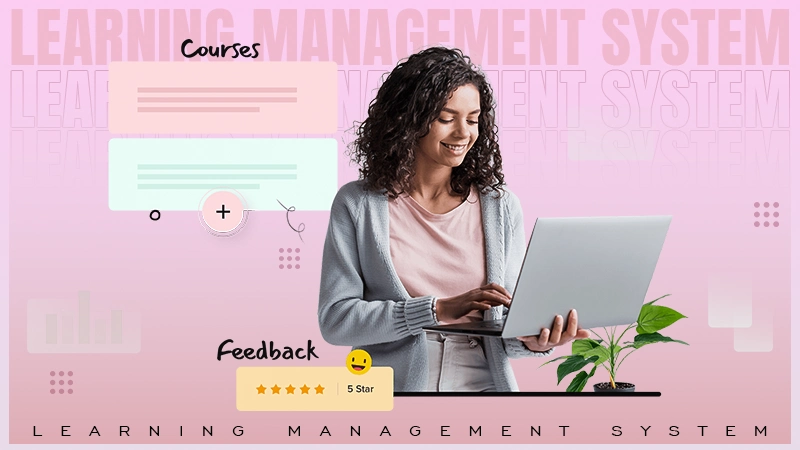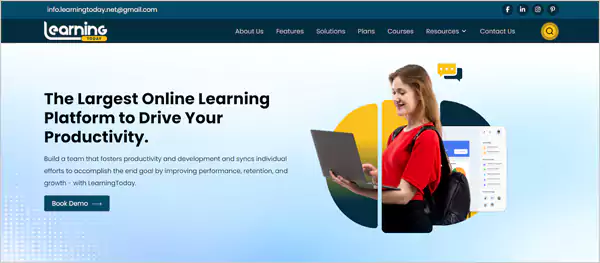
The learning management system, an acronym for LMS, is software that is extensively used in teaching and training programs. These software programs are commonly used in ed-tech industries, but they have the capability and are programmed to do a lot more.
With the integration of AI and advanced features, LMS is the definitive example of a complete solution for various industries. Furthermore, the usage and adoption of LMS have an everlasting, lingering effect both externally and internally on organizations.
In this article, we will cover more about LMS meaning, its types, uses, benefits, and a lot more. So, without any delay, let’s get into it.
What Does LMS Mean?

So, what is an LMS, exactly? Well, LMS can be considered as an extended part of the blended learning model, which consists of extra features and wider usability. The basic function of the learning management system is to provide course or training materials in the form of digital resources.
The material includes PDFs, videos, quizzes, citations, handbooks, manuals, and so on. Moreover, these LMS solutions also allow the instructor to monitor the progress and guide the trainees on the subject.
There are several types of learning management systems, each satisfying different needs and providing distinctive benefits. These advantages cater to various training needs through a digital platform by maintaining the personal touch.
Also Read: Top 22 Fun Skills to Learn in 2025 When You Have Time to Kill
Key Features of LMS
As we are aware, learning is a lifelong process and LMS just enhances the way we learn and retain information. The most noteworthy features are:
- Blended Learning: One thing that is quite difficult to address in traditional education is that each individual has a different learning pace. This hindrance is removed with LMS, which offers the blended learning model that helps them to reconcile study material at their own pace.
- Reporting and Analytics: Learning management systems allow you to keep track of progress, making it easy for the instructor to manage the results efficiently under one dashboard.
- Helps Identify Areas of Improvement: You can keep an eye on those areas where trainees or students might need assistance.
- Course Creation and Customization: Many LMS allow you to customize and modify course and study materials. There are numerous pre-existing templates that instructors can customize as per the requirements.
- Gamification: Games like elements like quizzes, flashcards, and crosswords keep trainees hooked and make the learning process more fun.
- Accessibility: The best part of LMS is that students and trainees can access course material anytime and anywhere on any device. Whether it’s mobile, PC, or laptop, the teaching material can easily be accessed on all devices.
- E-commerce: Learning management system features are not just limited to providing a learning platform, they also assist you in selling courses. You can create your course and sell it with a customizable and captivating user interface.
- Communication: Instructors can share any message or solve queries through communication options via text or video conferencing. This is a great way to solve any problem related to the course.
- AI Assistance: With AI, many of the repetitive unfruitful tasks can be automated. Additionally, you can generate AI content for training material that will save a lot of your time.
These were the basic features of LMS, although they can vary depending upon the type of LMS and its purpose. Moving on, let’s talk about the types of Learning management systems in the market.
Read More: 27 Professional Goals Examples for a Prosperous Career
What are the Benefits of an LMS?
A learning management system not only helps to manage the learning and training process but also provides convenience in many aspects.
- Saves Training Cost: It is no longer a latent fact that corporate sectors and industries waste millions and billions on training programs for their existing or onboarding employees. This wastage occurs due to unfruitful activities, wastage of training materials, unnecessary movement of resources, and so on. By implementing the learning management system, these unnecessary expenses can be avoided.
- Flexible Training: Each individual has a different pace and level of understanding. Depending upon the capability, the person might take less or more than the time required. This is the biggest drawback in a traditional training system, where such needs are ignored. Leveraging LMS allows individuals to follow the program at their own pace, and set better learning outcomes.
- Automates Tasks: Repetitive tasks such as reminding or updating students, reporting, tracking, and certificate generation are a few of the tasks that can be done automatically with an LMS. This saves you a lot of time and unnecessary attention.
- Reduces Employee Turnover: Proper training with bona fide certification and reports allows employees to contribute much better to an organization that creates harmony among employees and employers. Without in-hand training, we often witness mistakes and a lack of productivity that creates frustration and increases the chances of employee turnover. LMS can assist the organization by providing top-grade training simulations.
- Makes it Easy to Track Progress: Individually keeping track of trainees would be a difficult and complex task. With a customizable and streamlined dashboard, it becomes easy for the instructors to keep track of trainees.
- Boosts Your ROI: Choosing an LMS that perfectly aligns with your needs is a one-time investment. You’ll get an automated solution that can boost your operations in various manners and ultimately contribute to better ROI.
- Centralized System: LMS offers every insight into a course or program under one dashboard. This gives complete transparency to trainers, allowing them to limit the accessibility of data to certain administrations and configure the features as needed.
Furthermore, LMS is capable of assisting you with every formidable task in learning management with its comprehensive features.
Also Read: 11 Organizational Skills That Will Help You Stand Out
8 Types of Learning Management Systems
There are distinct types of LMS based on the features, type of server, industry to cater to, and budget. Here are 8 different types of LMS you should know about:
Cloud-Based LMS
Cloud-based or SaaS LMS can be accessed at any time and from any device. Allowing trainees and trainers to conduct their classes without any limitations.
It is easy to deploy, and you are required to pay small maintenance fees. Additionally, it allows you to customize features according to your needs. However, not all cloud-based LMSs come with a customizing option, which creates a problem if you want to update existing citations.
Open-Source LMS
As the name suggests, the open-source LMS refers to those solutions that have open-source code. This is a cost-effective option and doesn’t require you to pay any fee, making it viable for small businesses.
The major concern with such LMS is that it would be easy to set up initially, but it takes an extra effort for updates. Moreover, in some cases, you would also require an expert to run open-source LMS.
Closed-Source LMS
As discussed above, closed source is just the opposite of open-source LMS. It relieves you from complex technicalities and for that, you would be required to pay a subscription fee. The best part with closed-source is that you get technical support that will save a lot of your time and energy.
Enterprise LMS
Enterprise LMS is a synonym for commercial LMS that caters to the needs of large industries. With the enterprise-level learning management system, you get multilingual support, real-time tracking, more computing capabilities, and can handle heavy traffic on the platform.
Custom LMS
This is the most demanding LMS that is meant for dynamic situations. A business always tackles a lot of complex situations and in such complex situations, a custom-built LMS can cater to any specific need. You have full control over what kind of experience you want to provide in training based on your audience.
Installed LMS
Installed LMS can be compared to traditional installed applications where it has to be installed on your device. Unlike cloud-based or web-based LMS, your data is stored on a device that gives you full control over data security. This is a perfect choice for those industries that want to preserve their data and maintain integrity. However, installation and setup can be time-consuming.
Mobile LMS
Nowadays, everyone uses a smartphone, and it is quite convenient for users. Mobile LMS is ideal for smartphones and can be accessed at any time. This makes learning more fun and convenient, because of the element of gamification.
LMS with Authoring Tools
LMS with authoring tools is suitable for those who have a low level of technical expertise. With this, you can create your online course from scratch with ready-made templates, and integrated AI lets you keep track of records as well. With proper tracking, you can identify the steep learning curve and gain the required insights to customize the learning experience.
These are the top 8 types of LMS, and you can also refer to our LMS examples blog to know more about the types and various industries it caters to.
Also Read: 13 Best Free Textbooks Online Websites (2025): Read Books for Free
How Do Learning Management System Help Businesses?
As mentioned above, a learning management system can easily be customized and can cater to any industry as per the requirement. Let’s understand with an example of the most prominent solution LearningToday, it is specifically designed to provide flexible assistance.

LearningToday LMS can cater to the needs of both the organizational management and external stakeholders. With this full-stacked LMS, you can assist in:
Training of Onboarded Employees
If we look at the report from Forbes, billions of dollars are wasted in the corporate sector for training employees. This wastage occurs in the form of training materials, learning tools, hiring of executive coaches, and unproductive days due to employee training.
As mentioned above, LMS can be a great tool that can save lots of money and put a halt to the wastage of training materials. Onboarded employees can easily access the materials and citations from any device, which makes it easy for employers to track records as well.
Training of Existing Employees
Existing experienced employees will always be very valuable for any organization. In the landscape of evolving business, it is important to keep your employees fully equipped.
To do this without disrupting daily operations, a learning management system could be a helping hand. LearningToday LMS is the one-stop solution for this and can easily be customized according to your business needs. Moreover, the advanced tracking option and collaborative learning option can make it quite easy for enterprises to upskill their workforce.
Training of Partners
The learning management system can also be used to train business partners, which would help them to know about the product. LMS can eliminate the need for person-to-person training, which saves a lot of time and attention that can be diverted to something more meaningful. It gives you a newly onboarded partner to feel more confident about your products and communicate better in the market.
Customer Training
Every business that ceases to exist in the market is due to a lack of focus on customers’ attention. It is important to give exclusiveness and top-notch experience that can be attained if they are properly trained about your product or services.
If a customer has bought a product that has a lot of technical aspects, then it becomes important to train them to operate such hi-tech products. This can effectively be done through LMS, where customers can go through several resources to have more in-depth information regarding the product.
This would ultimately create trust and boost the credibility of the brand, hence it would also reduce the chances of the product getting damaged due to incorrect usage. LearningToday LMS is designed specifically for such conditions, where it can be customized according to audiences.
Selling Courses
The usage of a learning management system is not limited to providing training materials, you can also sell them. LMS like Skillshare, Udemy, and Learn Dash are some prominent examples where instructors can list and sell their courses. These LMSs are just like an e-commerce platform where your record and progress are being tracked to provide you with a certificate when your course is completed.
The best part about learning management software is its compatibility. LMS can revolutionize industries that require training or upskilling.
How to Choose an LMS?
LMS isn’t a one-size-fits-all, there are several considerations to make before choosing a suitable learning management software that abides by your needs.
Before selecting an LMS software to integrate with your system, here are some factors or steps to consider.
Determine Objective
First and foremost, identify your purpose to incorporate such software into your day-to-day operations. Whether the purpose of the learning management system is to assist you with the training of employees or provide customer assistance.
Always prioritize features while deciding an LMS, as they should meet up to your objectives. These clear goals will help you to narrow down options for software, and it will be easy to identify the best one.
Always Check Reviews
Platforms like Capterra or G2, where you’ll find genuine reviews posted by software users, will help you to get better ideas about the product. You may get to know about product specifications and pros and cons.
Additionally, such platforms may also assist you with discovering more options that cater to your requirements.
Free Trial
Once you have identified the suitable software by adhering to the above-mentioned step, the next thing you can do is ask for a free trial or demo. This would allow you to get hands-on experience and know much more about usability, interface, features, and so on.
Apart from these considerations, you can also reach out to experts in these fields as they would give more valuable insights.
Is LMS the Future of Learning?
Before the pandemic in 2020, the concept of the virtual classroom was just fiction and looked like a long-awaited reality. We are now well-versed with advanced technology such as metaverse, AI, AR, and so on, and they are being integrated into our daily lives.
LMS solutions have made it easy for teachers to keep track of student’s progress and identify areas where improvement is required. The most prominent aspect of LMS is that it can be customized according to the various needs of institutes and organizations.
It is safe to say that a learning management system in a couple of years could be the backbone of the training and learning industry. With the constant enhancement and integration of AI and AR in learning management software, we will witness a revolution by eliminating the limitations of traditional training and teaching methods.
Read Next: What is Post Secondary Education? Understanding Its Importance and Benefits
FAQs
Ans: Yes, Google Classroom can be considered an LMS, but it has limited features if we compare it to other top LMS solutions.
Ans: Yes, LMS is a cloud-based solution that provides a virtual classroom setting that doesn’t require you to install any applications or hardware.
Ans: Some LMS software, like LearningToday allows users to access training material and videos offline.
Ans: Google Classroom, ATutor, Moodle, and Chamilo are some of the best free LMS training software available.
Ans: LMS software can be tailored according to the needs of the organization. Providing after-sales service in the form of product training improves the customer experience, reducing customer churn.
Sources:
Benefits Of Putting A Live Spin On Learning Management System –
Forbes